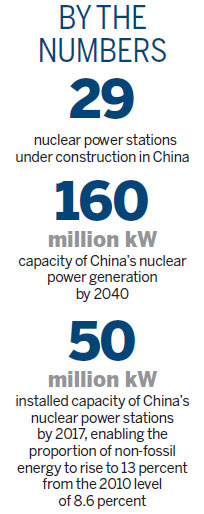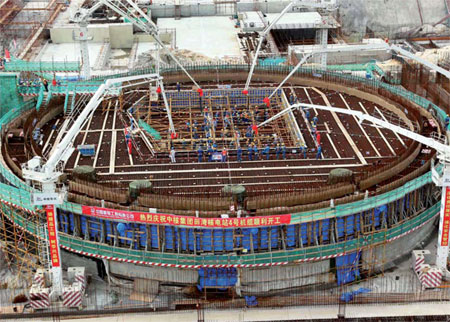Burning ambition for nuclear
Updated: 2013-10-18 09:29
By Wu Wencong (China Daily Europe)
|
|||||||||||
|
Construction takes place at the No 4 unit of Tianwan Nuclear Power Plant. Wang Jianmin / for China Daily |
Public reaction
Despite the claims by experts, it has not been smooth sailing for some nuclear projects. Public protests led to the scrapping of a uranium processing plant in Jiangmen, a city in Guangdong province.
However, Zhao from the Nuclear Safety Management Department says production of fuel elements is the safest section of the entire nuclear power production chain. "It carries fewer risks than those posed by the nearby chemical plants," he says.
Echoing similar views, Chen of the Nuclear and Radiation Safety Center says lack of awareness about the examination and approval process, and the safety of nuclear energy and fuel, had led to the protests in Jiangmen.
Residents in Heshan, where the project was originally located, reacted peacefully to it because the local government made efforts to communicate with them. However, residents in Jiangmen were not thoroughly informed about the project details, says Zhang Yongwang, an official with China National Nuclear Corp, the project's original investor.
A two-day conference aimed at promoting better public understanding of nuclear power, with participants from all levels of nuclear and radiation departments and companies, was held in Nanjing, the capital of Jiangsu province, in early September.
"The government should introduce these procedures for similar nuclear projects to a wider group of people phase-by-phase to win their trust in the future," Zhang says.
Zhang's suggestion may soon become a compulsory legal procedure for all nuclear power-related projects, as a law dedicated to nuclear safety is being drawn up.
"Articles relating to public participation will definitely be included in the law," Zhao says.
Zhai Yong, head of the law chamber of the Environment Protection and Resources Conservation Committee of the 12th National People's Congress, says the new law will regulate only nuclear facilities, and focus more on safety throughout the power generation process.
"The basic principle for the law is preventing all types of pollution," Zhai says. "Every process of the operating procedure at nuclear power plants will be covered."
He says the revamp of the nuclear safety law was partly triggered by the Fukushima Daiichi nuclear power plant disaster in Japan. Another reason is that China's nuclear program is now slowly getting back on track.
To date, the 10-year-old Radioactive Pollution Prevention Act is the nation's only law relating to nuclear and radiation safety. It is accompanied by seven administrative regulations and 27 departmental rules.
"The act is the first law in China to manage production in the nuclear industry. It covers not only nuclear power stations, but also radioactive ore, and the regulations regarding the safety issue are relatively simple," Zhai says. He adds that an Atomic Energy Act is also being prepared, which will focus mainly on the peaceful use of atomic energy.

Environmental cost
Beijing suspended approval for new nuclear power projects after the Fukushima accident. But Zhao from the Nuclear Safety Management Department says this was simply an adjustment of the development pace.
"This is mainly because of the pressure coming from airborne pollution, especially that from fine particles," he says. "To completely solve the problem, we must change our energy structure, which relies heavily on coal."
China's plan to promote nuclear power has not changed, Zhao says.
Construction work of the second phase of Tianwan nuclear power stations in Jiangsu province, which includes two new nuclear power generating units, started in late December last year, marking the restarting of the country's nuclear power projects after the Fukushima accident.
The environmental cost of nuclear power plants is also much lower than that of coal-fired plants. Greenhouse gases emitted during the nuclear fuel chain are only a-100th the level of those emitted during the coal-fuel chain under a similar scale, says Ye Qizhen, an academic at the Chinese Academy of Engineering.
Ye feels that nuclear power is a better choice for China than wind power, because the wind turbines required for the latter take up too much land.
The country used more than 500 billion kWh of electricity in August, an increase of 13.7 percent compared with the same period last year, according to data from the National Energy Administration.
"As public expectation of good air quality grows with the demand for electricity, the prediction that nuclear power will account for about 5 percent of China's total energy consumption by 2020 seems far from sufficient," Zhao says.
He says that huge consumption of coal has also become a great burden on the transport industry, adding that 60 percent of the country's rail capacity and 40 percent of its waterways capacity are reserved for coal transportation.
The UK has recently seen designs for the country's first new nuclear power plants in 25 years being approved by the Office of Nuclear Regulation and the Environment Agency. Poland plans to start operations at its first nuclear power plant by 2025, while construction of Turkey's first nuclear power plant is scheduled to begin later this year.
Germany and Switzerland, on the other hand, have announced plans to phase out or shut down their operating reactors, the former by 2022, and the latter by 2034.
French President Francois Hollande has set a goal to cut the share of nuclear power in the country's energy mix to 50 percent by 2025 from the current 75 percent.
"These countries' policies to phase out or reduce nuclear power after the Fukushima disaster were largely due to political considerations, such as public acceptance, rather than technical reasons such as safety issues," Zhao says.
He says these countries are at a different development stage than China, with much less demand for energy.
"They may still choose renewable energy such as biomass, wind, solar, hydro and geothermal, or buy electricity from other countries to meet their own needs," says Zhao.
Germany's decision to switch from nuclear to renewable sources of energy will require an investment of 250 billion euros ($340 billion) over the next decade, according to AFP, quoting a 2011 study by German investment bank KfW Bankengruppe.
The French government may have to invest an additional 434 billion euros on electricity generation facilities to meet domestic demand, if the share of nuclear power in the energy mix falls to 50 percent by 2025, according to China Business News, quoting recent findings from French research.
However, the French government's decision to cut nuclear power in their energy mix will not affect its nuclear business in global markets, including China, a senior official from Electricite De France, the world's largest nuclear power operator, told China Business News.
A statement of long-term cooperation, which marks cooperation in nuclear power for the next 30 years, among Electricite De France, Areva and China General Nuclear Power Group, the largest nuclear power operator in China, was signed on April 25.
wuwencong@chinadaily.com.cn
(China Daily European Weekly 10/18/2013 page6)
Today's Top News
Scientists requested government to plant GM crops
Travelers to Europe bypass attractions of Brussels
Li urges greater effort on reforms
'Constructive ideas' on thorny issues needed
US deal key to nabbing fugitives
JPMorgan, DOJ reaches $13b deal
As China's economy grows, so does reform call
Expanded property tax trials predicted
Hot Topics
Lunar probe , China growth forecasts, Emission rules get tougher, China seen through 'colored lens', International board,
Editor's Picks

|

|

|

|

|

|






